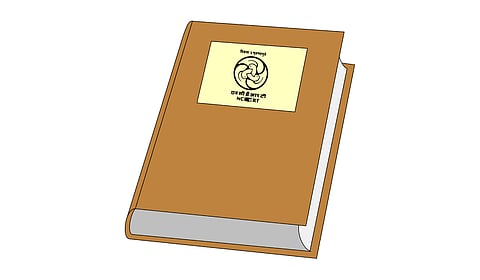

NEW DELHI: Facing criticism for renaming new textbooks in Hindi, the National Council of Educational Research and Training (NCERT) on Thursday said the books have been “thoughtfully named to convey rootedness in India’s culture and knowledge systems.”
The NCERT response came after Kerala General Education Minister V Sivankutty on Monday criticised NCERT's decision to use Hindi titles for English-medium textbooks, describing it as a profound irrationality and a cultural imposition that undermines India’s linguistic diversity.
“The new NCERT textbooks have been thoughtfully named to convey rootedness in India’s culture and knowledge systems. The names of the books are from Indian languages and not specifically Hindi,” said an official NCERT statement shared with this paper.
The English textbook for Grades 1 and 2 is titled ‘Mridang’, derived from Mridangam, a widely recognised percussion instrument associated with Carnatic music. The Grade 7 textbook, Poorvi, is named after a raga, traditionally sung at dusk, said the statement.
“Similarly, the Ganit Prakash mathematics textbook draws from India’s rich mathematical heritage. The title has been chosen to attract children's curiosity about the rich mathematical heritage of the country,” the statement added.
“Having Indian names for Mathematics or English language textbooks shall not only promote pride in Indian languages and culture but also generate curiosity about our rich cultural and scientific heritage,” it said.
The Kerala minister had said that replacing long-standing English titles, which foster sensitivity and understanding among students, with Hindi titles such as ‘Mridangam’ and ‘Santoor’ is inappropriate. He had also said that NCERT’s decision undermines federal principles and constitutional values.
The CPI-M leader called on the NCERT to review and withdraw this decision and urged all states to unite against such impositions. He emphasised that education should be a tool for empowerment and consensus, not for imposition.
The NCERT rolled out new textbooks aligned with the National Education Policy (NEP) and the National Curriculum Framework for School Education (NCFSE) 2023.
New textbooks were introduced for classes 1 and 2 in 2023, and books for classes 3 and 6 were rolled out last year. New textbooks are being released for classes 4, 5, 7, and 8 this year, and the rest will be rolled out next year.
The English textbooks for classes 6 and 7 are now titled Poorvi. Earlier, the class 7 English textbook was titled Honeycomb, and the class 6 English book title was Honeysuckle. This time, the class 4 English book is Santoor; earlier, it was Marigold.